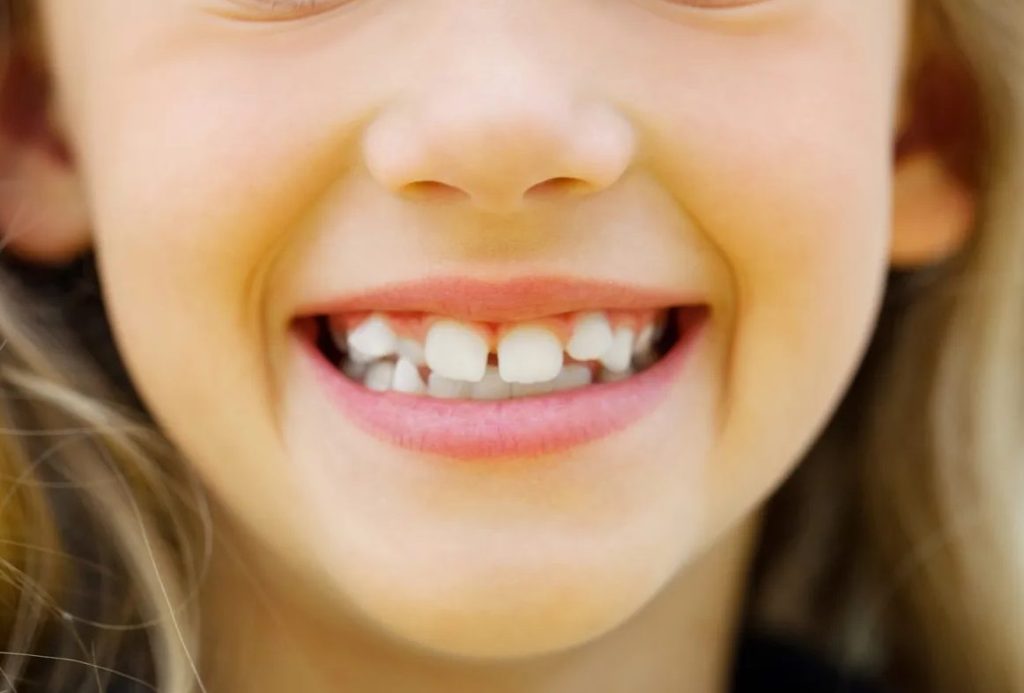There is no clearer demonstration of the difference between America and Britain than their attitudes towards teeth. In America, you fix them. Doesn’t matter if they’re nearly straight. You subject yourself to years of semi-torture to achieve the American dream — a white picket fence of perfectly uniform teeth.
Most perfect teeth are artificial — some so artificial that they’ve entirely replaced the real ones
When I was about eleven, I was taken to the orthodontist to straighten out my slightly overlapping front teeth. I dreaded those appointments. Our orthodontist was a tall, overly friendly man with large hairy fingers which he would shove into my tiny mouth without gloves. Surely that broke protocol even back then. “They’re clean,” he’d say, as the mossy hairs on his tree-trunk fingers tickled my lips and caught between my teeth.
But hey, I got to choose the color of the torture bands which forced my baby teeth into formation. My whole mouth ached for days after each tightening. But this was just normal. Every kid I knew had a braces phase, some longer than others, and some more humiliating. One of my friends had to sleep with a head brace that looked like a wire dog muzzle. She would emerge from it in the morning looking like she’d been in a dog fight too, hair wild and matted, jaw slack and dripping saliva.
I didn’t have a night time head brace. Instead I had a metal hinge glued to my top and bottom teeth at the back — a Herbst. This one really did look like a torture device. The hinge where the two bars met was so big that it wore holes in the sides of my cheeks. No matter. Cheek flesh grows back. This contraption was intended to correct my overbite, fixing my lower jaw so that it grew outwards instead of backwards. Maybe it was worth it. Maybe if I saw a photo of my grown-up self without the Herbst treatment, I’d be glad I had it.
Every American family I know agrees that putting their kids through years of orthodontic agony is better than ending up with “British teeth.” In one scene in The Simpsons, Chief Wiggum’s son Ralph visits the dentist’s office where he is shown what happens to little boys who don’t take care of their teeth. “Let’s look at a picture book, Ralph,” the dentist says: he opens The Big Book of British Smiles. Ralph screams. The relentless images of protruding British teeth — to Americans, there is almost nothing worse.
But crooked doesn’t mean unhealthy, and this is what Americans get wrong. According to a worldwide oral health survey, 40 percent of people in the UK reported that they had no oral health problems — the highest among the countries in the survey. The report also reveals that people in the UK go to the dentist for regular check-ups more often than Americans. My husband is an exceptional case: (“If you don’t go to the dentist, they can’t find anything wrong”), but he has a point. Almost ten years had passed since he’d been to a dentist, and when he finally did go, his teeth were perfectly fine. No cavities. This drew outrage and disbelief from American relatives, whose twice-annual trips often reveal plaque build-up and several molars on their way to cavities. What’s the secret? Does my husband floss twice a day? Use mouthwash stronger than nuclear waste? No, he says; “I just brush.”
He would be the first to admit that his teeth aren’t perfect. There’s a crack in one of the front ones, a relic from when he tried to push open a door that said “Pull.” But who cares? His teeth suit him. He regards perfectly straight, brilliantly white teeth with suspicion: “It feels like they’re hiding something,” he says. He’s right that most perfect teeth are artificial — some so artificial that they’ve entirely replaced the real ones.
A growing number of people go abroad for a cheap operation, shaving down their real teeth and getting “Turkish Teeth” in their place. TikTok videos show young people filing down their real teeth with nail files to make way for fake ones. Do these people realize that their adult teeth won’t grow back? And if you go under knife (or the nail file) to perfect one body part, won’t every other part need updating to match it? It’s like a home DIY project — paint and refurbish one room and the others look ugly by comparison. Leave them alone and they gain character, remaining distinctly, uniquely yours. My children are school age now, and soon we will be nearing the age for braces. I don’t know how it works in Britain, whether my children will be encouraged to have braces if their teeth show any sign of coming in crooked, and I don’t know if I will encourage it either. Their faces are so beautiful as they are. My four-year-old son already has a chipped front tooth from when he face-planted while running down an airplane gangway, but to me it makes his smile more adorable.
Even after all the years of braces, my top teeth are beginning to overlap again. I hadn’t noticed this until my dentist pointed it out. “Do you want to correct that?” I agreed to a night aligner, so we did the dental mould and when the aligner arrived my dentist tried to fit it onto my top teeth. It hadn’t been cut to the right size so when he shoved it on, the sharp plastic edges cut my gums. I took the aligner home anyway. This was three years ago and it’s still sitting, untouched, on my bedside table.
This article was originally published on The Spectator’s UK website.


























Leave a Reply